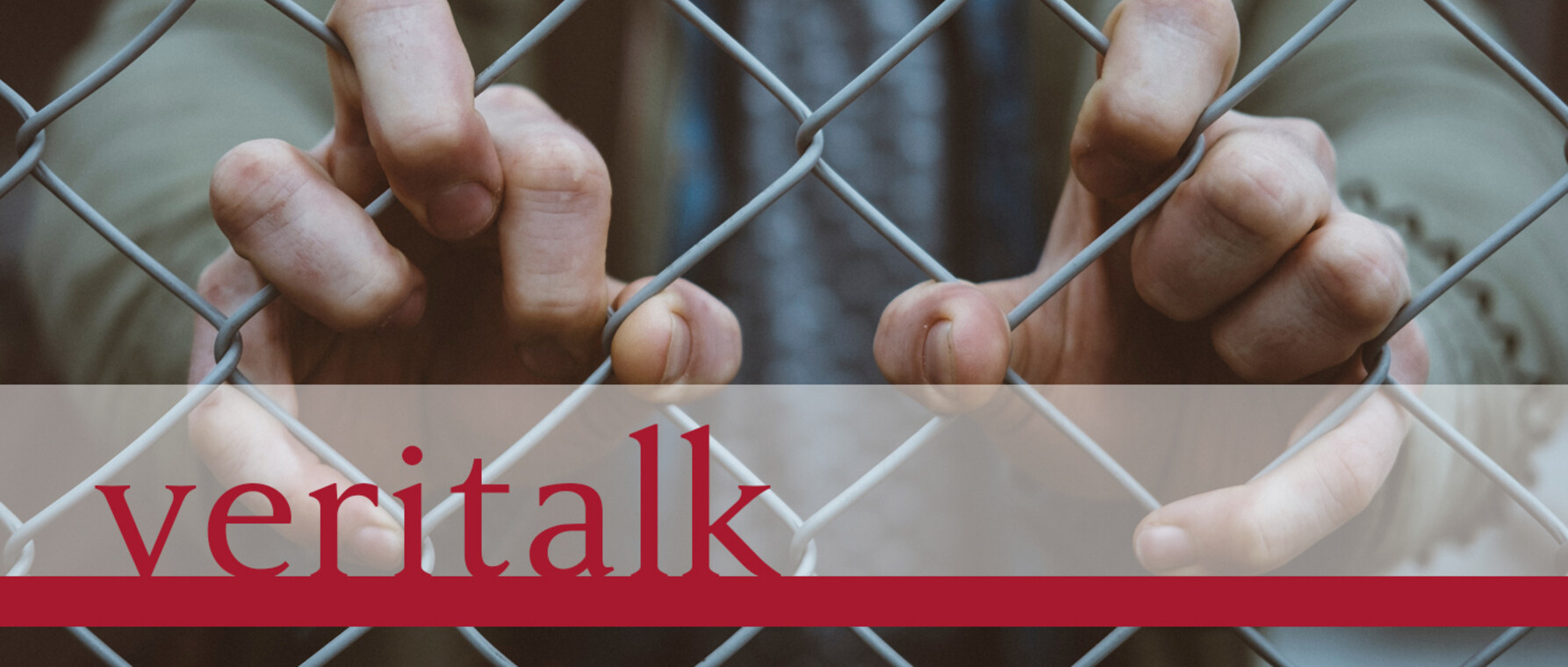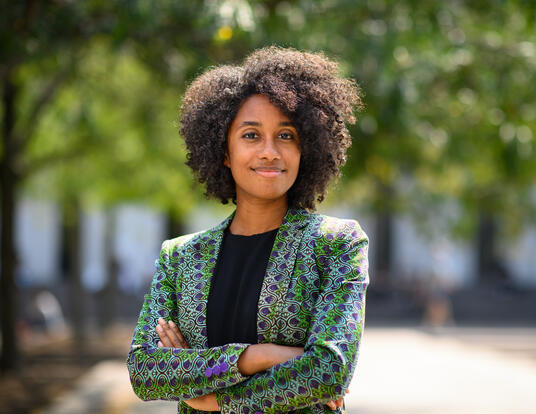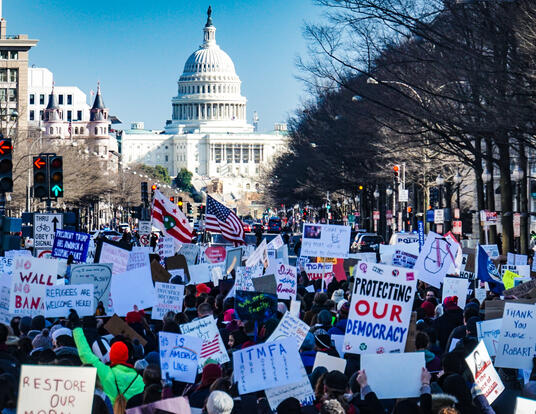Veritalk: Displacement Episode 3 - The Estranged

PhD graduate in social policy Monica Bell’s interviews with poor youth of color in Baltimore led her to formulate the idea of “legal estrangement.” While the press focuses on a “trust gap” between Black youth and the police, Monica believes that the issue is far deeper. Her interviews revealed a generation of young Americans who feel both stateless and powerless.
Find new episodes of Veritalk on Apple Podcasts.
Full Transcript
Voices: I mean, why?
Anna Fisher-Pinkert: From the Harvard Graduate School of Arts and Sciences, you’re listening to Veritalk. Your window into the minds of PhDs at Harvard University.
Overlapping voices
AFP: I’m Anna Fisher Pinkert. In this mini series, we’re talking about Displacement. Why and how do people get set apart, or set adrift from from home? And we’re going to answer that question through the research of PhD students in different fields at Harvard. To start today’s episode, I want you to think about the phrase “displaced people.” What image comes to your mind? For me, I see a gray, dismal people marching along a road in Eastern Europe - the kind of road that I imagine my own ancestors traveled on when they fled the pogroms. It could be different for you - you might hear “displaced” and think about people clinging to life rafts in the Mediterranean sea. Or families sheltering in a rain-soaked shantytown in Burma. But you probably aren’t thinking about Baltimore, Maryland. But Monica Bell sees displacement right here in the United States, in the middle of American cities - displacement that is actually happening to American citizens. Monica just graduated from Harvard’s Graduate School of Arts and Sciences with a PhD in sociology.
Monica Bell: I'm also an associate professor of law at Yale. I study, basically, criminal justice in community context.
AFP: Before coming to Harvard, Monica was a fellow at the Legal Aid Society in DC.
MB: My fellowship project was to help with the legislative advocacy, primarily. But I also did intake with potential clients. So one of the things that came up over and over again in the process of doing intake was, you know, you interview someone who comes in and they fill out a form and say this is the legal problem I have. When you actually interview them your goal is to try to get them to really hone in on the legal problem. But they want to tell you all this other stuff that brought them to this point. You know, they want to tell, often, a much broader story.
AFP: Monica heard about families with problems getting jobs, problems getting welfare, problems with schools and housing. As a lawyer at Legal Aid, she didn’t have time to think about the context for those problems. So in her first year in her PhD program at Harvard, Monica interviewed DC mothers who qualified for Section 8 housing.
MB: Originally my mission was more to be able to capture people's stories and people's struggles in a way that I couldn't in the context of legal practice.
AFP: But then, in 2015, a 25-year-old Black Baltimorean named Freddie Gray suffered a severe spinal injury while riding in the back of a police van, and died.
Woman's voice: And I know they killed him . . .
AFP: Freddie Gray’s death led to protests in Baltimore, some of which turned violent. Monica wanted to understand how young adults and teens of color thought about what was happening in their community.
MB: That was a couple months after the Freddie Gray incident and the unrest and rebuild wanted to ask young people about their experience during that event, but also beyond. The first question we started with was, "tell me the story of your life," which is a big question, but it just gets people talking and then you can follow up.
AFP: From there, Monica found that young people of color were telling the same story, over and over again.
MB: Over and over again we're hearing incidents of . . . I don't want to call it -- disrespect I think cheapens it. It was this sense that they were. . . that they and people like them, I guess I should say, were kind of considered almost not fully human by the police.
AFP: For example, there was this one young guy that Monica interviewed -- he had graduated from high school, a major feat for someone from his neighborhood, and was working his way through community college.
MB: This young person is 23 is older than most of the respondents and this wonderful kid who really wanted to be -- his goal was to become a marine biologist.
AFP: One day, he and a friend are standing on the street when the police start questioning them - which Monica says is pretty typical.
MB: Just standing outside is apparently a violation if you're a young person in Baltimore.
AFP: The police find drugs on the friend, but they decide to arrest both young men.
MB: One of the stories that he told was you know telling the police officers who arrested him about the fact that he was a college student and he wanted to study marine biology, and they seemed really supportive and they were like, “Oh so you have a good head on your shoulders.” But at the end of the day they didn't do anything about his situation. He said he felt almost like they were giving him false hope because they listened to his story, and were affirming in a way. But structurally he was still basically shut out of his education.
AFP: He was shut out because after the arrest, he spent three weeks in jail. Even though the charges were dropped, three weeks was enough to put him behind in his schoolwork -- which forced him to drop out of college.
MB: He's trying to stay positive, the way he always has been, but it's a real battle. He said he feels like he's trying to do mission impossible. And he has so much he wants to say. He's really upset and he's seen a lot of friends stopped struggling, but he doesn't want to.
AFP: When the media reports on Black youth in places like West Baltimore, Monica says the story is typically focused on the interactions between the police and young men - like the one that happened in 2015 between Freddy Gray and the Baltimore Police. But Monica thinks that sociologists can’t ignore the other institutions in a community -- like schools, courts, and other government agencies.
MB: We were asking questions about policing and criminal justice, but the police were kind of this minor player in this story. The bigger story was a sense that all of the institutions around them were sending these messages of their irrelevance.
AFP: As I'm listening to that story I keep thinking, you know, it's the the shootings and the killings of young Black men that make headlines, when they do make headlines, but it seems like if you were to take all of these smaller run ins and add them up together that that would have a corrosive effect of a different kind.
MB: Absolutely. The stories we were hearing over and over again were not about people being killed by police. There were stories about people being harassed by the police a lot. But but the thing about the story I just told is there was no real what one might think of as "harassment." In fact, other than questioning these young men on the street . . . I'm not sure if the initial investigation was warranted, but I don't know enough of the details to say. But setting that aside, the interaction kind of went it was as it was supposed to. The problem is the meaning of that interaction. The problem is this sense that a number of different types of interactions, whether they're legal, or not can signal a lack of humanity and a lack of kind of social inclusion, a sense that the police just don't care.
AFP: That lack of social inclusion is what matters to Monica. What happens when a whole generation feels that they are outsiders in their own communities? Monica calls this concept “legal estrangement.”
MB: So the concept of legal estrangement is essentially a subjective sense that people have that they are stateless. That they are without the protection of the state and they are without the sort of care and concern of the state. It’s a sense of being excluded, even though you're part of the polity. That's why I termed it estrangement - because it's not full separation. It's not full alienation. It's a sort of in-between liminality. I came up with this concept in part because a lot of the other concepts that I was reading about didn't capture what mothers and particularly and young people in Baltimore were telling me about their experiences.
AFP: Sometimes you hear policymakers talk about a trust gap between poor people, immigrants, communities of color, and the police, or politicians, or just the system more generally. But I think what you're describing is that this isn't a trust gap. It's something beyond that. It's something else. Can you kind of differentiate between the two a little bit.
MB: There's a lot of literature on this kind of trust in the police, the legitimacy of the police, and the questions all come back to how can we build trust in the police and in the state, and all of these institutions. And my question with that is always why is trust the relevant outcome. People often talk about the legitimacy of the police and how we need to support the legitimacy of the police that idea of legitimacy originated with Max Weber.
AFP: Weber - spelled W-E-B-E-R - is a 20th century German economist and sociologist. Monica thinks that the way we talk about the police in America can be traced back to his ideas.
MB: The question that Weber was really concerned with was how the state exercises its authority over people, and how do people perceive the authority of the state as is something that they should adhere to. And so the question is, there are different types of legitimacy, essentially. And so the core, the baseline concern, that the legitimacy language gets you to is understanding authority.
AFP: But, understanding authority doesn’t necessarily help you understand everything about what’s happening in Baltimore. Or Ferguson. Or Oakland. To get a broader understanding, Monica thinks that we need to take a page from Emile Durkheim, a late 19th century French sociologist.
MB: I'm less interested in understanding authority and more interested in understanding what Durkheim referred to as "social solidarity." So, basically, how do we get all the different groups in society to stick together. And that is a question that is related in some sense to trust, obviously, I think. But the the baseline outcome isn't about authority. It's about togetherness. It's about inclusion and cohesion.
AFP: What Monica found in her interviews with young people is that they are missing that sense of inclusion.
MB: So one of the themes that came up consistently is young people saying, "OK well, I'm gonna move, I've got to move out of here." People essentially wanted to separate their fate from what they saw as Baltimore's fate. So, you know, people wanting to move to the country, that was a generic term, or to various other cities around the US -- and in one case Australia. It's the idea of trying to create an alternative life because there is no sense that they have any power to alter the institutions around them.
AFP: And that feeling of powerlessness came out in the interviews Monica and her colleagues conducted.
MB: We would ask them, "what do you think would make things better?" or "how do you see the future of Baltimore?" And over and over again, it was you know, “Baltimore's doomed,” they would call Baltimore "setup city," any number of titles that were not flattering, mostly because of this, this lack of belief in the possibility of change. And so that's what I'm most worried about. If we if we imagine a future, one would hope that that future would involve empowering, to use maybe an overused word, but kind of power-building within communities such that that the institutions that they feel are oppressing them, they could make them more productive, right? So I mean theoretically, you might want young people from these communities to grow up and become the police officers, to become the leaders of these institutions, so that maybe they will stop operating in that way. But there was no one, not a single young person in the sample who expressed any desire to kind of engage in traditional politics, for example. I mean you had some activists, but no one like "I want to be the mayor of Baltimore. I want to be the police commissioner." But that's the kind of solution that oftentimes people imagine, and I just don't see a lot of belief in those processes.
AFP: The situation seems intractable. But Monica thinks that we need a different kind of solution - a solution that acknowledges the legal estrangement of poor people of color.
MB: I think we have to think different structurally. So for example, we don't have meaningful civilian oversight of the police in many, if not any places. I mean there are some places like Cincinnati and Seattle where they have civilian oversight boards and community policing boards that may have more power. But in general, when people talk about civilian oversight what they're referring to is individual officer accountability. They're not talking about a device through which communities can dictate what the priorities of the police are, and how the police will do their work. And so, as one kind of affirmative solution, I think, is to reimagine these institutions so that you have a democratic body composed of civilians to which the police actually have to be accountable -- not just as officers who have individually going off the rails and there's a response to a grievance -- but accountable in terms of their policies and their priorities.
AFP: The other solution might be to avoid police intervention in social problems. Monica also thinks that the police are asked to resolve too many community problems that they aren’t really well-suited to deal with. For example, in DC, if your child refuses to go to school, you can call the police department and get a probation officer assigned to your child.
MB: And the probation officer makes sure the kid goes to school, and their probation officer may or may not give the child drug tests. It's a criminal justice-oriented solution to truancy, which is not necessarily a criminal justice problem. I'm certainly very much in line with many people who say we need to get away from criminal justice solutions to non-criminal issues and construct a meaningful social welfare state to deal with problems in a non-punitive way without expanding the role of criminal justice.
AFP: Monica believes that there are many small steps that communities could take to improve the relationship between poor people of color, and the institutions that have authority over those communities. But ultimately, it comes down to the same question that Argyro Nicolaou and Cresa Pugh asked about refugees -- how does a society start to understand and embrace people who have lived at the margins? How do we see each other, and how do we connect?
This is the end of our mini-series on Displacement. I hope you’ll stay tuned for more - we have great stuff coming up. Don’t forget to rate us with five stars on Apple Podcasts, Google Play, Radio Public, or wherever you get your podcasts. And while you’re there, leave us a review.
Veritalk is produced by me, Anna Fisher-Pinkert. Our executive producer is Ann Hall. Our sound designer is Ian Coss. Our logo is by Emily Wilson. Special thanks to Graham Ball, Philip Kearney, Cresa Pugh, Argyro Nicolaou, and Monica Bell.
Logo by Emily Wilson
Get the Latest Updates
Join Our Newsletter
Subscribe to Colloquy Podcast
Simplecast Stitcher





